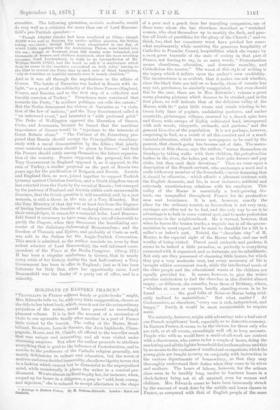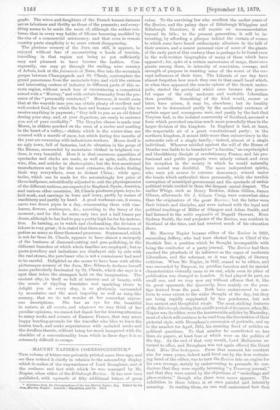HOLIDAYS IN EASTERN FRANCE.*
"TRAVELLING in France without hotels or guide-books " might, Mrs. Edwards tells us, be, with very little exaggeration, chosen as the title to her latest book, which, were it not for the extraordinary prejudices of the writer, would have proved an exceedingly pleasant volume. It is in fact the account of a succession of visits to one agreeable family after another in a part of France little visited by the tourist. The valley of the Marne, Mout- ladliard, Besancon, Lons-le Saunier, the Jura highlands, Cham- pagnole, Mom, and St. Claude, all offered to the traveller much that was unique and interesting, and all were visited under charming auspices. But when the author proceeds to attribute everything that is good to the influence of Protestantism, and to ascribe to the professors of the Catholic religion generally, not merely deficiencies in culture and education, but the worst of motives and even decided immorality, she allows bigotry to run riot in a fashion which cannot but be distasteful to the unprejudiced mind, while occasionally it places the writer in a comical pre- dicament. We are almost inclined to pity her, for instance, when, cooped up for hours in a diligence, a prey to " cold, heat, cramp, and dejection," she is reduced to accept alleviation in the shape * Holidays in Eastern France, By M. Botham-Hdwards, London: Hurst and Blaokett. of a pear and a peach from her travelling companion, one of those nuns whom she has elsewhere described as "wretched women, who shut themselves up to mortify the flesh, and prac- tise all kinds of puerilities for the glory of the Church ;" and we think, too, that her conscience must have pricked. her some- what unpleasantly while receiving the generous hospitality of Catholics in Franche Comt6, hospitalities which she repays by a most gross travestie of the state of society iu that part of France, not fearing to say, in so many words, " Protestantism means cleanliness, education, and domestic morality, and Catholicism the reverse." The worst of this style of writing is the injury which it inflicts upon the author's own credibility. The incorrectness is so evident, that it makes one ask whether, since the black tints are laid on so heavily, those of roseate hue may not, perchance, be similarly exaggerated. But even should this be the case, there are in Mrs. Edwards',:i volume a great many pleasing pictures which deserve to be studied ; and in the first place, we will indicate that of the delicious valley of the Marne, with its " quiet little rivers and canals winding in be- tween lofty lines of poplars, undulating pastures, and amber cornfields, picturesque villages, crowned by a church spire here and there, wide sweeps of highly cultivated laud, interspersed with rich woods, vineyards, orchards, and gardens," and the general bien.dtre of the population. It is not perhaps, however, surprising to find, as a result of all this comfort and of a much vaunted education, which causes newspapers to be read by the poorest, that church-going has become out of date. The manu- facturers of Brie cheese, says the author, " amuse themselves on. Sundays by taking walks with their children, the paterfamilias bathes iu the river, the ladies put ou their gala dresses and pay visits, but they omit their devotions." Then we come upon a description of the French servant, who exchanges a word. and a smile with every member of the household,—never dreaming that it should be otherwise,—which affords a pleasant contrast with the English domestic, and his, in most instances, artificial and extremely unsatisfactory relations with his employer. This valley of the Marne is essentially a fruit-growing dis- trict, one unequalled. throughout France for its productive- liess 'and luxuriance. It is not, however, exactly the• place for the ordinary tourist, as locomotion is not very easy,. carriages are often not to be had, and the only way to see it to advantage is to halt in some central spot, and to make pedestrian excursions in the neighbourhood. He is warned, however, that when he leaves the beaten tracks, a wayside inn is all the accom- modation he must expect, and he must be thankful for a lift in a miller's or baker's cart. Noisiel, the "chocolate city" of M.. Monier, is the especial sight of the Marne valley, and one well worthy of being visited. Placed amid orchards and gardens, it. seems to be indeed a little paradise, so perfectly is everything connected with it organised, and so fortunate are its inhabitants. Not only are they possessed of charming little homes, for which they pay a very moderate rent, but every necessary of life is brought within convenient reach, while the intellectual needs of the elder people and the educational wants of the children are equally provided for. It seems, however, to give' the writer peculiar satisfaction to find the churches in this district almost empty ; so different, she remarks, from those of Brittany, where,. " whether at mass or vespers, hardly standing-room is to be found the good folks of Seine-et-Marne being evil- ently inclined to materialism." But what matter I' At. Coulommiers, as elsewhere, " every one is rich, independent, and happy." Surely it would be most unreasonable to require more.
We certainly, however, might with advantage take a leaf out of our French neighbours' book, especially as to domestic economy. In Eastern France, it seems to be the custom for those only who are rich, or at all events, exceedingly well off, to keep servants.. People who with us would have a maid-of-all-work are content with a charwoman, who comes iu for a couple of hours, doing the marketing and all the lighter household duties themselves; and this by no means to the exclusion of intellectual occupations, which the young girls are taught to carry on conjointly with instruction in the various departments of housewifery, so that they may thoroughly understand their duties when they come to be wives and mothers. The hours of labour, however, for the artisan class seem to be terribly long, twelve to fourteen hours in a clock-factory being not at all unusual, even for women and children. Mrs. Edwards seems to have been immensely struck by the amount of work done by the middle and lower classes in France, as compared with that of English people of the same.
grade. The wives and daughters of the French tenant-farmers are as laborious and thrifty as those of the peasants; and every- thing seems to be made the most of, although the author con- fosses that in every way habits of life are becoming modified by the rise of a commercial aristocracy, and that even in remote country parts simplicity is to some extent disappearing.
The glorious• scenery of the Jura can still, it appears, be 'enjoyed without fear of encountering a horde of tourists, travelling in that region not being as yet sufficiently easy and pleasant to have become the fashion. Con- sequently, one may go through the smiling wino country of Arbois, look at the faiencerie of Nans, dive into the mountain gorges between Champagnole and St. Claude, contemplate the grand panoramas from the mountain-tops, and visit the curious and interesting centres of industry in 'different parts of this re- mote region, without much fear of encountering a compatriot armed with a " Murray," and with certain immunity from the pre- sence of the "personally conducted." Moreover, it would seem that at the wayside inns you can obtain plenty of excellent and well-cooked food, for which the host and hostess scarcely like to receive anything in payment ; " they talk to you as an old friend during your stay, and, at your departure, are ready to embrace you out of pure cordiality." The Gruybre cheese is made near Morez, in chfilets perched on the crest of a ravine and nestling in the heart of a valley,—chfilets which in the winter-time are covered with a mantle of snow, but which during five months of the year are swarming with industrious workers. Morez itself is an ugly town, full of factories, but its situation in the gorge of the Bienne, surrounded by mountains clothed in brightest ver- dure, is very beautiful. Here it is that enormous quantities of spectacles and clocks are made, as well as spits, nails, drawn wire, files, and articles in electro-plate ; but the first-mentioned manufactures are by far the most extensive, the clocks finding their way everywhere, even to distant China ; while spec- tacles, which can be made for the astonishingly low price of -three-halfpence, scientifically adjusted to suit the physiognomies of the different nations, are exported. to England, Spain, America, and various other countries. St. Claude produces pipes, toys, in- laid work, and carvings in bone and ivory, partly by means of machinery and partly by hand. A good workman can, it seems, oarve two dozen pipes in a day, ornamenting them with vine- loaves, flowers, arabesques, &c., according to the fancy of the moment ; and for this he earns only two and a half francs per 'dozen, although he has had to pay a pretty high fee for his instruc- tion. In turning, as in watch and clockmaking, the division of labour is very great; it is stated that there are in the former occu- pation as many as three thousand processes. Septmoncel, which is not far from St. Claude, appears to have almost a monopoly of the business of diamond-cutting and gem polishing, in the different branches of which whole families are employed ; but as paste-jewellery and imitations are displayed side by side with the real stones, the purchaser who is not a connoisseur had need to be careful. Delighted as she seems to have been with all the picturesque scenery of the Jura, Mrs. Edwards declares herself more particularly fascinated by St. Claude, which she says is a spot that takes the strangest hold on the imagination. The ancient city,in itself so full of interest and of beauty, with the' music of rippling fountains and sparkling rivers to delight you at every step, is so gloriously surrounded by mountains and the most imposing as well as fairy-like scenery, that we do not wonder at her somewhat raptur- ous descriptions. She has an eye for the beautiful in nature, at all events, and whatever we may think of her peculiar opinions, we cannot but thank her for drawing attention to many nooks and corners of Eastern France, that may prove happy hunting-grounds for the traveller who likes to leave the beaten track, and make acquaintance with secluded nooks and the dwellers therein, without being too much hampered with the shackles of a conventionality from which in these days it is so .extremely difficult to escape.



































 Previous page
Previous page